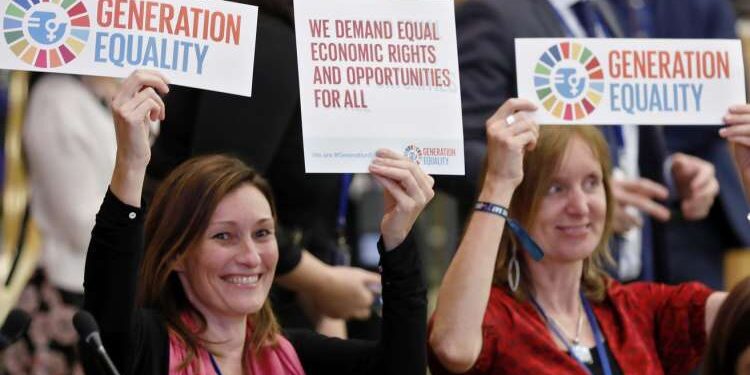Despite the efforts made worldwide, gender equality is far from being reached, said the UN on Thursday, September 7, 2023, by publishing its latest report on the issue.
The 2023 edition of the study “Progress towards the achievement of sustainable development objectives: close-up on gender equality”, carried out by UN Women and the UN economic and social affairs department, draws up a disturbing medium-term table in the sustainable development program by 2030.
To the current rate of progress, the next generation of women will spend another 2.3 more hours per day to domestic work and unpaid care than men
More than 340 million women and girls, or about 8% of the world female population, will live in extreme poverty by 2030, and almost one in four will experience moderate or serious food insecurity, if current trends continue, warns the study.
This annual publication provides a global analysis of the current gender equality situation for the 17 Sustainable Development Goals (SDGs) and highlights dominant trends, gaps and recent setbacks on the way to achieving gender equality by 2030.
For the first time, this year’s report includes data ventilated by sex on the links between gender and climate change.
In the worst climatic scenarios, by the middle of the century, climate change could dive 158.3 million additional women and girls in poverty, 16 million more than the total number of poor men and boys.
The report focuses more particularly on elderly women and reveals that they are faced with higher poverty and violence rates than elderly men. In 28 of the 116 countries for which data is available, less than half of the elderly benefit from a pension, and in 12 countries, less than 10% have access to a pension.
The report shows that the world drops women and girls and highlights the urgent need for concrete efforts to accelerate progress towards gender equality by 2030, revealing that an additional $ 360 billion per year will be necessary to achieve gender equality and the empowerment of women in the main global objectives.
The report also includes calls for an integrated and global approach, an increased collaboration between stakeholders, continuous funding and political actions to combat gender disparities and empower women and girls around the world, concluding that not giving priority to gender equality now could jeopardize the entire sustainable development program on 2030.
Highlights and figures
* In the worst climatic scenarios, food insecurity should affect 236 million additional women and girls, compared to 131 million additional men and boys, due to climate change.
* The eradication of violence between intimate partners is still within the reach of any country, and only 27 countries have complete monitoring and budget allocation systems relating to gender equality and the empowerment of women.
* The number of women and girls living in a context of conflict has increased significantly, with catastrophic consequences. In 2022, the number of women and girls living in such a context reached 614 million, 50% more than in 2017.
* At the current rate, it is estimated that on the global scale, in 2030, 110 million girls and young women will not be educated.
* Sex disparities remain high regarding employment and income. For each dollar that men gain as a worldwide income, women earn only 51 cents. Only 61.4% of women in the age of age are part of the active population, against 90% of men in age force.








